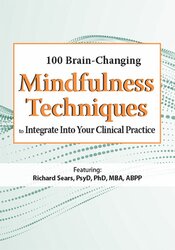

Enhance your treatment plans for anxiety, depression, ADHD, OCD, bipolar disorder, sleep, pain, and stress with brain-changing mindfulness skills tailored to the problems your clients face each day.
Watch this recording and get detailed guidance on the hows, whys, and whens of incorporating core and advanced mindfulness skills into your clinical practice.
Build your client education skills and improve therapeutic engagement with clear explanations regarding the neurobiology behind mindfulness. Interactive demonstrations and step-by-step instruction on specific interventions and exercises will give you the tools you need to treat a variety of disorders and populations, and will boost your confidence in using your new skills. Better still, you’ll walk away with a four-step process that ties it all together, making what you’ve learned immediately relevant to your own work with clients.
| File type | File name | Number of pages | |
|---|---|---|---|
| Manual - 100 Brain-Changing Mindfulness Techniques (6.5 MB) | 47 Pages | Available after Purchase | |
| Manual - 100 Brain-Changing Mindfulness Techniques - French (6.5 MB) | 47 Pages | Available after Purchase | |
| Manual - 100 Brain-Changing Mindfulness Techniques - Italian (6.5 MB) | 47 Pages | Available after Purchase | |
| Manual - 100 Brain-Changing Mindfulness Techniques - German (6.5 MB) | 47 Pages | Available after Purchase | |
| Manual - 100 Brain-Changing Mindfulness Techniques - Spanish (6.5 MB) | 47 Pages | Available after Purchase |

Rochelle Calvert (Voth), PhD, CMT, SEP, BCBA, is the founder of New Mindful Life. She has studied mindfulness for the past 16 years and has taught classes, courses, workshops and retreats. Rochelle leads classes/courses/seminars in Six-week Introductory Training in Mindfulness, (S.I.T.), Awake in the Wild- Nature-Based Mindfulness retreats, Mindfulness-Based Stress Reduction (MBSR), Mindfulness Based Cognitive Therapy (MBCT), Mindfulness Based Eating, Mindful Parenting and Mindful Workplace. She also facilitates professional trainings in mindfulness for clinicians and travels the country teaching seminars for PESI. She also works as clinical psychologist in private practice in San Diego.
Rochelle offers mindfulness, nature-based therapy and somatic experiencing as a psychologist with New Mindful Life. Her therapeutic approach includes teaching people individual mindfulness meditations - both indoors and outdoors - specific to their unique concerns to support healing. She also integrates somatic experiencing healing (body-based healing through nervous system reorganization) with the mindfulness and nature-based meditation practices. Rochelle has therapeutic specialty areas of training to support integration of these services to individuals struggling with life transitions, depression, anxiety, PTSD, pain conditions, eating disorders, as well as families of developmentally delayed children/adults.
Speaker Disclosures:
Financial: Rochelle Calvert is in private practice and is an adjunct faculty for Southwestern College and New Earth Institute. She is an author who receives royalties. Rochelle Calvert receives a speaking honorarium and recording royalties from PESI, Inc. She has no relevant financial relationships with ineligible organizations.
Non-financial: Rochelle Calvert has no relevant non-financial relationships.
Mindfulness – the Neurobiology of Brain Changes
4 Steps to Integrate Mindfulness into Clinical Practice
Mindfulness Strategies for Specific Disorders
Anxiety & Depression
PTSD
Panic & OCD
Bipolar Disorder
ADHD
Pain & Sleep
Please wait ...